Bill Ballie on the Imperial Mindset and Obscured Roots of Racialism and Early British Socialism in UK Nationalism
Nation Revisited # 144 October 2018
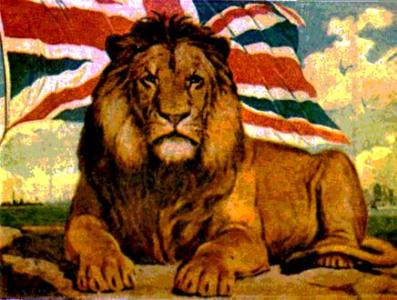
The Imperial Mindset.
When nostalgic Brexiteers look back to the ‘good old days’, the summers were warmer, the food was tastier, and the dogs and people were friendlier. They have convinced themselves that it was a Golden Age before we joined the old Common Market in 1973. They have forgotten about the strikes and confrontations, the poor productivity, and the years of stagnation.
Some of them believe that the British Empire was destroyed by conspiracies but history tells a different story. When the Japanese won their war with Russia in 1905 they showed that the European powers were vulnerable, and when they took Singapore from Britain in 1942 they proved their point to the subject peoples of Asia and Africa. We fought colonial wars in Malaya, Kenya, Aden, and Cyprus but there was no stopping “The Wind of Change.” Within thirty years of WW2, all that was left of the Empire was a few outposts like Gibraltar and the Falklands.
Those of us born in the last days of the British Empire are proud of our achievements. We built roads, railways and bridges all over the world and bequeathing a civil service, a judiciary, and a parliamentary system to our colonial subjects. The British Empire was a force for civilisation and progress, but it was also the source of cheap food that damaged our agriculture, the producer of cheap cotton goods that destroyed our textiles industry, and the supplier of immigrants that undercut our wages and conditions. We discovered the hard way that commerce overrules sovereignty and that people follow goods across borders. In the days of Empire we recruited workers from the West Indies; as members of the EU we signed up to its rules and conditions, and if we are swallowed up by the United States we will import contaminated food and commit our troops to ‘perpetual war’.
Capitalism has been global since the days of the East India Company. We fought the Chinese to force them to buy our opium; we fought the Afrikaners for their gold and diamonds, and we fought the Turks to steal the Arabian oilfields. But the days of trade enforced by bayonets are over. We belong to NATO and our armed forces are under the command of General Curtiss Scaparroti, Supreme Allied Commander Europe. We are members of the United Nations and subject to the International Court of Human Rights. We belong to the International Monetary Fund, and the World Bank. If we leave the EU we will operate under the World Trade Organisation. And the majority of our immigrants come from outside the EU, mainly from Africa and Asia.
We pro-Europeans believe in beneficial access to markets, incoming investment, and peace in Northern Ireland. And, realising that the Empire has gone, we see our future in terms of European co-operation. We also know that wages are far too low and that immigration can only be controlled by international agreement.
These arguments have been thoroughly debated but the decision to leave the EU was largely emotional. Abstract ideas of ‘sovereignty’ were more important than economics. In fact, some on the Brexiters are happy to accept a lower standard of living for the illusion of sovereignty.
As for immigration, the Brexiteers don’t regard West Indians, Africans and Asians as foreigners, after all, they play cricket and most of them speak English. They are happy to admit our former colonial subjects but they are determined to stop the Poles.
Neither side has a monopoly on patriotism but some people are fond of shouting “traitor” at the opposition. That’s unfair because we all want the best for our country. People are not traitors because they have a different opinion, and shouting abuse at foreigners does not make one a patriot. We are entering uncharted waters and time alone will tell who is right and who is wrong.
The BBC
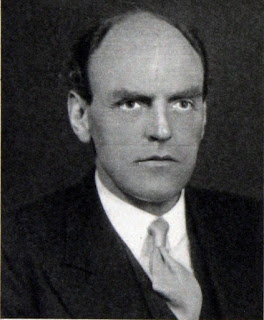
John Reith 1889-1971 photo credit BBC.
The British Broadcasting Corporation is a state-owned media empire that was founded by the brilliant Scottish engineer and radio pioneer John Reith in 1922. His original intention was for the service to be educational as well as entertaining. Left-wingers accuse it of being right-wing and right-wingers accuse it of being left- wing. The truth is that it supports the establishment, not necessarily the government of the day but the overriding liberal-capitalists consensus.
[MR editorial note: Nationalists being against corrupt establishment is indicative of what we are calling “Left Nationalism”]
The Corporation is funded by an annual ‘licence fee’ of £147.00. If you watch TV in the UK you must pay the licence fee, even if you are watching a foreign station. This unfair levy is the main source of the BBC’s massive income of nearly five billion pounds. It wastes this money on presenters like Chris Evans who earned £2.2 million last year, Gary Lineker who earned £1,7 million, and Graham Norton who got £850,000. The BBC also has legions of journalists, researchers, and photographers who fly around the world gathering news stories. And it spends a fortune on legal fees and settlements.
The British government is struggling to find money for the National Health Service, defence, education, and almost everything else. But we allow the bloated BBC to waste billions of pounds on broadcasters and bureaucrats. We should stop this madness by selling it off; the TV and radio stations, the buildings, the news service, the sports franchises, and everything else.
And we should not fall for the myths of impartiality and quality surrounding the Corporation. It’s forever congratulating itself on its high standards, but it’s as biased as any other state-owned propaganda outlet, and most of its TV and radio programs are made by independent production companies.
The licence fee should be abolished and the slimmed-down company should be paid for by adverting revenue, with any profits going to the state. Presenters should be paid an industrial wage and the service should be returned to John Reith’s founding principles. The current BBC is a money-gobbling monster that’s out of control. We should sack the lot of them and start again.
Post-Brexit Policies
When we leave the EU the political parties will no longer be able to blame everything on Europe, they will be forced to address our problems. As I write, they are holding their annual conferences and making their promises for the future.

Theresa May is clinging to her Chequers plan despite the fact that it has been rejected by the EU and most of her party. The Tories have abandoned austerity and are promising to build more social housing and increase public spending. They have also promised to reduce corporation tax so an increase in income tax is inevitable.
Jeremy Corbyn expects to win the next general election and he has promised to renationalise the railways, the Royal Mail, and the water companies. His chancellor, John MacDonald has revived the manifesto of the Italian Social Republic to give shares and seats on the board of companies employing more than 250 workers. When Benito Mussolini introduced this policy it was overtaken by events.
Vince Cable pledged that the Lib Dems would lead the fight against Brexit but our ‘first past the post’ electoral system is rigged against them. They have 12 seats at Westminster but under proportional representation they would have more than 50.
Ukip and the various parties of the far-right will lose most of their reasons for living when we quit Europe. But immigration will still be with us because most of them come from outside of the EU. The latest ONS figures show that in the last year 127,000 EU citizens came to the UK and 179,000 from the rest of the world. In fact, if we sign trade deals with China and India we will probably admit more of them.
All of the parties are promising to increase defence spending, but if our economy shrinks we will have even less money to spend. We may have to stop pretending to be a world power and deploy our armed forces for the defence of the UK, instead of getting involved in Afghanistan and the Middle East. That would mean more frigates and destroyers but we would not need two gigantic aircraft carriers and a fleet of nuclear submarines.
Education also needs sorting out. France and Germany provide free education from nursery to university and so should we. We must gear our educational system to provide the doctors, engineers and scientists that we need instead of relying on immigration.
Crime continues to rise despite official figures to the contrary. Fewer thefts are being recorded because people know that it’s a waste of time reporting crimes to the police. They are far too busy ‘celebrating diversity’ to worry about crime.
And housing is as important as ever. If all the Poles and other European workers went home we would still have a desperate housing shortage. Immigration aggravated the housing crisis but it did not cause it.
The political parties need to keep up with changing circumstances. Policies and websites must be updated and obsolete slogans discarded. It will be interesting to see if they can ditch the rhetoric of the last half-century and address the problems of today.
Sir Leslie Plummer
In 2017 Home Secretary Amber Rudd cracked down on the Internet by threatening to jail visitors to far-right websites for 15 years. She used to live with Kwasi Kwatern, an Old Etonian Tory MP of African heritage, but she was not the first MP to champion multi-culturalism. That honour must go to Sir Leslie Plummer.
He was the Labour MP for Deptford who made his name and earned his knighthood as the boss of the disastrous groundnut scheme in East Africa. He wasted £49 million trying to harvest peanuts in parched scrubland where they stubbornly refused to grow. This was in 1949 when Britain was bankrupt and living on borrowed money.
Undeterred by his African misadventure Sir Leslie introduced his Racial Discrimination Bill in 1957, but it was talked out by the splendid Tory MP Ronald Bell. Plummer’s drastic proposal would have made it illegal to criticise immigration from the West Indies.
John Bean’s British National Party stood two candidates in the local election in Deptford in 1961; John Stanton and Alan Charman. They put out a hard-hitting election leaflet which accused Plummer of:
“Coming down solidly on the side of coloured spivs and their vice dens as opposed to the white people of Deptford.”
Sir Leslie Plummer sued for libel and was awarded £2,000 damages. The famous Brighton solicitor and author FJP Veale (pictured) volunteered his services but the case was resolved when the ‘honourable member’ obligingly dropped dead on a visit to New York in 1963.
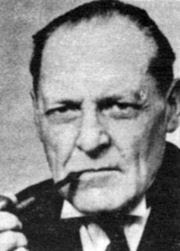
To put these sums of money into perspective, the average weekly wage for a working man in 1949 was £2.50 and in 1961 it was £15.00. When I started work with ‘The News Chronicle’ as a trainee teleprinter operator in 1960 I was earning £3.00 a week.
Civilisation
Our journey from the caves to the stars has been driven by hereditary but climate and geography have played their part. Britain, France, Spain and Portugal built great overseas empires because they face the Atlantic. And Alexander the Great conquered all the territory between Macedonia and India because the rival Persian Empire was in the way.
We also borrowed from other civilisations; writing and bookkeeping from the Phoenicians, mathematics from the Indians, astronomy from the Arabs, paper and gunpowder from the Chinese, and so on. When the body of a Patrician Roman lady was recently discovered in the City of London she was wearing an embroidered gown from Iraq and Jade jewellery from Japan.
The Australian Aboriginals had practically no connection with the outside world. Black Africans were taken to the Americas as slaves and came to Europe as economic migrants, but the Aboriginals have been confined to Australia for thousands of years. When Captain James Cook first encountered them in 1788 they were still living in the Stone Age and their conditions have hardly improved since.
A few of them managed to get an education but it wasn’t until 1927 that the first book by an Aboriginal was published. It was ‘Aboriginal Legends’ by David Unaipor (pictured), who features on the Australian $50 bill.
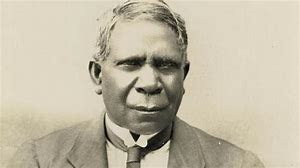
In 1944 Reg Saunders was commissioned as the first Aboriginal officer in the Australian Army, and Les Waters became the first Aboriginal military aviator.
In 1966 Charles Perkins became the first Aboriginal BA graduate at the University of Sydney, but by 2014 there were more than 400 indigenous PhDs.
The Australian Aboriginals are probably the least developed people in the world but given the chance, they are capable of advancement. A lot of nonsense has been written about the noble savage living as nature intended, but the reality of life in the desert is poverty and ignorance. The average Aboriginal lives a shorter life than a white Australian. Jim Calma, the Social Justice Minister said: “A gap or 10 or 17 years is utterly unacceptable in a country like Australia which prides itself on a fair go for all.”
Civilisation is maintained by education. Unfortunately, many young Blacks in the UK are immersed in a culture of violence. Instead of following the many worthy role models of their own race they hero-worship pimps, drug dealers and gangsters. Many people believe that race is the determining factor in civilisation but this was disputed by Julius Evola:
“The unity and purity of blood are believed by some to be the foundation of life and the strength of a civilisation; therefore, the mixing and the ensuing ‘poisoning’ of the blood are considered the initial cause of a civilisations decline. This too is an illusion, which amongst other things, lowers the notion of civilisation to a naturalistic and biological plane, since this is the plane on which race is thought of in our day and age.”
There are three possible solutions to mass migration; deportation, annihilation, or assimilation. The first choice would be a massive undertaking requiring international agreement and unlimited funds. The second is morally and practically impossible. The third choice is viable but it must be done in support of our culture and civilisation.
Socialist Roots
Jeremy Corbyn’s young supporters would be horrified to discover that the pioneers of their movement were nationalists. In his essay ‘Nationalism, Racialism and Early British Socialism’ Richard Lawson traces the origins of the Labour Party back to men like Robert Blatchford (pictured) who was a nationalist and a socialist; a patriotic Englishman who believed in social justice.
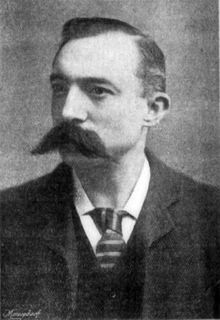
Lawson examines the ideas of Pete Curran, George Bernard Shaw, Beatrice and Sydney Webb, HM Hyndman, and HG Wells. It’s interesting to note that all of them would be considered anti-Semitic by today’s standards because they denounced ‘Jewish Capitalism’. But people were not so sensitive in the old days. He concludes:
“The obvious patriotism and candid racialism of these early socialists is in marked contrast to the attitudes and views held by socialists today. The triumph of internationalism and the change from an open-minded and well-meaning approach to a mindless religious fanaticism is a reflexion of the changing genetic composition of socialism’s own advocates.”
Lawson does not mention Oswald Mosley or John Beckett, genuine patriots who left the Labour Party in disgust at its betrayal of the working class. They sacrificed their careers and their liberty to build a socialist system within the British Empire. But modern nationalists have no such principles, they have lurched to the far-right by focusing on sovereignty and immigration. Most of them are ‘Daily Mail’ readers who doff their caps to big business.
Richard Lawson was a member of the Strasserite wing of the National Front which flourished briefly in the Seventies. His essay is posted on the website of the Institute for Historical Review - http://www.thr.org
—————————————————————————————————————-
All articles are by Bill Baillie unless otherwise stated. The opinions of guest writers are entirely their own. This blog is protected by the UN Declaration of Human Rights, Article 19: “We all have the right to make up our own minds, to think what we like, to say what we think, and to share ideas with other people.
